- Home
- Roald Dahl
Completely Unexpected Tales: Tales of the Unexpected. More Tales of the Unexpected Page 8
Completely Unexpected Tales: Tales of the Unexpected. More Tales of the Unexpected Read online
Page 8
'I've never seen anyone roll a cigarette as fast as that,' I said.
'Ah,' he said, taking a deep suck of smoke. 'So you noticed.'
'Of course I noticed. It was quite fantastic.'
He sat back and smiled. It pleased him very much that I had noticed how quickly he could roll a cigarette. 'You want to know what makes me able to do it?' he asked.
'Go on then.'
'It's because I've got fantastic fingers. These fingers of mine,' he said, holding up both hands high in front of him, 'are quicker and cleverer than the fingers of the best piano player in the world!'
'Are you a piano player?'
'Don't be daft,' he said. 'Do I look like a piano player?'
I glanced at his fingers. They were so beautifully shaped, so slim and long and elegant, they didn't seem to belong to the rest of him at all. They looked more like the fingers of a brain surgeon or a watchmaker.
'My job,' he went on, 'is a hundred times more difficult than playin' the piano. Any twerp can learn to do that. There's titchy little kids learnin' to play the piano in almost any 'ouse you go into these days. That's right, ain't it?'
'More or less,' I said.
'Of course it's right. But there's not one person in ten million can learn to do what I do. Not one in ten million! 'Ow about that?'
'Amazing,' I said.
'You're darn right it's amazin',' he said.
'I think I know what you do,' I said. 'You do conjuring tricks. You're a conjurer.'
'Me?' he snorted. 'A conjurer? Can you picture me goin' round crummy kids' parties makin' rabbits come out of top 'ats?'
'Then you're a card player. You get people into card games and deal yourself marvellous hands.'
'Me! A rotten card-sharper!' he cried. 'That's a miserable racket if ever there was one.'
'All right. I give up.'
I was taking the car along slowly now, at no more than forty miles an hour, to make quite sure I wasn't stopped again. We had come on to the main London-Oxford road and were running down the hill towards Denham.
Suddenly, my passenger was holding up a black leather belt in his hand. 'Ever seen this before?' he asked. The belt had a brass buckle of unusual design.
'Hey!' I said. 'That's mine, isn't it? It is mine! Where did you get it?'
He grinned and waved the belt gently from side to side. 'Where d'you think I got it?' he said. 'Off the top of your trousers, of course.'
I reached down and felt for my belt. It was gone.
'You mean you took it off me while we've been driving along?' I asked, flabbergasted.
He nodded, watching me all the time with those little black ratty eyes.
'That's impossible,' I said. 'You'd have had to undo the buckle and slide the whole thing out through the loops all the way round. I'd have seen you doing it. And even if I hadn't seen you, I'd have felt it.'
'Ah, but you didn't, did you?' he said, triumphant. He dropped the belt on his lap, and now all at once there was a brown shoelace dangling from his fingers. 'And what about this, then?' he exclaimed, waving the shoelace.
'What about it?' I said.
'Anyone around 'ere missin' a shoelace?' he asked, grinning.
I glanced down at my shoes. The lace of one of them was missing. 'Good grief!' I said. 'How did you do that? I never saw you bending down.'
'You never saw nothin',' he said proudly. 'You never even saw me move an inch. And you know why?'
'Yes,' I said. 'Because you've got fantastic fingers.'
'Exactly right!' he cried. 'You catch on pretty quick, don't you?' He sat back and sucked away at his home-made cigarette, blowing the smoke out in a thin stream against the windshield. He knew he had impressed me greatly with those two tricks, and this made him very happy. 'I don't want to be late,' he said. 'What's time is it?'
'There's a clock in front of you,' I told him.
'I don't trust car clocks,' he said. 'What does your watch say?'
I hitched up my sleeve to look at the watch on my wrist. It wasn't there. I looked at the man. He looked back at me, grinning.
'You've taken that, too,' I said.
He held out his hand and there was my watch lying in his palm. 'Nice bit of stuff, this,' he said. 'Superior quality. Eighteen-carat gold. Easy to flog, too. It's never any trouble gettin' rid of quality goods.'
'I'd like it back, if you don't mind,' I said rather huffily.
He placed the watch carefully on the leather tray in front of him. 'I wouldn't nick anything from you, guv'nor,' he said. 'You're my pal. You're giving me a lift.'
'I'm glad to hear it,' I said.
'All I'm doin' is answerin' your questions,' he went on. 'You asked me what I did for a livin' and I'm showin' you.'
'What else have you got of mine?'
He smiled again, and now he started to take from the pocket of his jacket one thing after another that belonged to me - my driving-licence, a key-ring with four keys on it, some pound notes, a few coins, a letter from my publishers, my diary, a stubby old pencil, a cigarette-lighter, and last of all, a beautiful old sapphire ring with pearls around it belonging to my wife. I was taking the ring up to the jeweller in London because one of the pearls was missing.
'Now there's another lovely piece of goods,' he said, turning the ring over in his fingers. 'That's eighteenth century, if I'm not mistaken, from the reign of King George the Third.'
'You're right,' I said, impressed. 'You're absolutely right.'
He put the ring on the leather tray with the other items.
'So you're a pickpocket,' I said.
'I don't like that word,' he answered. 'It's a coarse and vulgar word. Pickpockets is coarse and vulgar people who only do easy little amateur jobs. They lift money from blind old ladies.'
'What do you call yourself, then?'
'Me? I'm a fingersmith. I'm a professional fingersmith.' He spoke the words solemnly and proudly, as though he were telling me he was the President of the Royal College of Surgeons or the Archbishop of Canterbury.
'I've never heard that word before,' I said. 'Did you invent it?'
'Of course I didn't invent it,' he replied. 'It's the name given to them who's risen to the very top of the profession. You've 'eard of a goldsmith and a silversmith, for instance. They're experts with gold and silver. I'm an expert with my fingers, so I'm a fingersmith.'
'It must be an interesting job.'
'It's a marvellous job,' he answered. 'It's lovely.'
'And that's why you go to the races?'
'Race meetings is easy meat,' he said. 'You just stand around after the race, watchin' for the lucky ones to queue up and draw their money. And when you see someone collectin' a big bundle of notes, you simply follows after 'im and 'elps yourself. But don't get me wrong, guv'nor. I never takes nothin' from a loser. Nor from poor people neither. I only go after them as can afford it, the winners and the rich.'
'That's very thoughtful of you,' I said. 'How often do you get caught?'
'Caught?' he cried, disgusted. 'Me get caught! It's only pickpockets get caught. Fingersmiths never. Listen, I could take the false teeth out of your mouth if I wanted to and you wouldn't even catch me!'
'I don't have false teeth,' I said.
'I know you don't,' he answered. 'Otherwise I'd 'ave 'ad 'em out long ago!'
I believed him. Those long slim fingers of his seemed able to do anything.
We drove on for a while without talking.
'That policeman's going to check up on you pretty thoroughly,' I said. 'Doesn't that worry you a bit?'
'Nobody's checkin' up on me,' he said.
'Of course they are. He's got your name and address written down most carefully in his black book.'
The man gave me another of his sly, ratty little smiles. 'Ah,' he said. 'So 'ee 'as. But I'll bet 'ee ain't got it all written down in 'is memory as well. I've never known a copper yet with a decent memory. Some of 'em can't even remember their own names.'
'What's memory got to
do with it?' I asked. 'It's written down in his book, isn't it?'
'Yes, guv'nor, it is. But the trouble is, 'ee's lost the book. 'Ee's lost both books, the one with my name in it and the one with yours.'
In the long delicate fingers of his right hand, the man was holding up in triumph the two books he had taken from the policeman's pockets. 'Easiest job I ever done,' he announced proudly.
I nearly swerved the car into a milk-truck, I was so excited.
'That copper's got nothin' on either of us now,' he said.
'You're a genius!' I cried.
''Ee's got no names, no addresses, no car number, no nothin',' he said.
'You're brilliant!'
'I think you'd better pull in off this main road as soon as possible,' he said. 'Then we'd better build a little bonfire and burn these books.'
'You're a fantastic fellow,' I exclaimed.
'Thank you, guv'nor,' he said. 'It's always nice to be appreciated.'
The Umbrella Man
I'm going to tell you about a funny thing that happened to my mother and me yesterday evening. I am twelve years old and I'm a girl. My mother is thirty-four but I am nearly as tall as her already.
Yesterday afternoon, my mother took me up to London to see the dentist. He found one hole. It was in a back tooth and he filled it without hurting me too much. After that, we went to a cafe. I had a banana split and my mother had a cup of coffee. By the time we got up to leave, it was about six o'clock.
When we came out of the cafe it had started to rain. 'We must get a taxi,' my mother said. We were wearing ordinary hats and coats, and it was raining quite hard.
'Why don't we go back into the cafe and wait for it to stop?' I said. I wanted another of those banana splits. They were gorgeous.
'It isn't going to stop,' my mother said. 'We must get home.'
We stood on the pavement in the rain, looking for a taxi. Lots of them came by but they all had passengers inside them. 'I wish we had a car with a chauffeur,' my mother said.
Just then, a man came up to us. He was a small man and he was pretty old, probably seventy or more. He raised his hat politely and said to my mother, 'Excuse me. I do hope you will excuse me...' He had a fine white moustache and bushy white eyebrows and a wrinkly pink face. He was sheltering under an umbrella which he held high over his head.
'Yes?' my mother said, very cool and distant.
'I wonder if I could ask a small favour of you,' he said. 'It is only a very small favour.'
I saw my mother looking at him suspiciously. She is a suspicious person, my mother. She is especially suspicious of two things - strange men and boiled eggs. When she cuts the top off a boiled egg, she pokes around inside it with her spoon as though expecting to find a mouse or something. With strange men, she has a golden rule which says, 'The nicer the man seems to be, the more suspicious you must become.' This little old man was particularly nice. He was polite. He was well-spoken. He was well-dressed. He was a real gentleman. The reason I knew he was a gentleman was because of his shoes. 'You can always spot a gentleman by the shoes he wears,' was another of my mother's favourite sayings. This man had beautiful brown shoes.
'The truth of the matter is,' the little man was saying, 'I've got myself into a bit of a scrape. I need some help. Not much, I assure you. It's almost nothing, in fact, but I do need it. You see, madam, old people like me often become terribly forgetful...'
My mother's chin was up and she was staring down at him along the full length of her nose. It is a fearsome thing, this frosty-nosed stare of my mother's. Most people go to pieces completely when she gives it to them. I once saw my own headmistress begin to stammer and simper like an idiot when my mother gave her a really foul frosty-noser. But the little man on the pavement with the umbrella over his head didn't bat an eyelid. He gave a gentle smile and said, 'I beg you to believe, madam, that I am not in the habit of stopping ladies in the street and telling them my troubles.'
'I should hope not,' my mother said.
I felt quite embarrassed by my mother's sharpness. I wanted to say to her, 'Oh, mummy, for heaven's sake, he's a very very old man, and he's sweet and polite, and he's in some sort of trouble, so don't be so beastly to him.' But I didn't say anything.
The little man shifted his umbrella from one hand to the other. 'I've never forgotten it before,' he said.
'You've never forgotten what?' my mother asked sternly.
'My wallet,' he said. 'I must have left it in my other jacket Isn't that the silliest thing to do?'
'Are you asking me to give you money?' my mother said.
'Oh, good gracious me, no!' he cried. 'Heaven forbid I should ever do that!'
'Then what are you asking?' my mother said. 'Do hurry up. We're getting soaked to the skin standing here.'
'I know you are,' he said. 'And that is why I'm offering you this umbrella of mine to protect you, and to keep forever, if... if only...'
'If only what?' my mother said.
'If only you would give me in return a pound for my taxi-fare just to get me home.'
My mother was still suspicious. 'If you had no money in the first place,' she said, 'then how did you get here?'
'I walked,' he answered. 'Every day I go for a lovely long walk and then I summon a taxi to take me home. I do it every day of the year.'
'Why don't you walk home now?' my mother asked.
'Oh, I wish I could,' he said. 'I do wish I could. But I don't think I could manage it on these silly old legs of mine. I've gone too far already.'
My mother stood there chewing her lower lip. She was beginning to melt a bit, I could see that. And the idea of getting an umbrella to shelter under must have tempted her a good deal.
'It's a lovely umbrella,' the little man said.
'So I've noticed,' my mother said.
'It's silk,' he said.
'I can see that.'
'Then why don't you take it, madam,' he said. 'It cost me over twenty pounds, I promise you. But that's of no importance so long as I can get home and rest these old legs of mine.'
I saw my mother's hand feeling for the clasp on her purse. She saw me watching her. I was giving her one of my own frosty-nosed looks this time and she knew exactly what I was telling her. Now listen, mummy, I was telling her, you simply mustn't take advantage of a tired old man in this way. It's a rotten thing to do. My mother paused and looked back at me. Then she said to the little man, 'I don't think it's quite right that I should take a silk umbrella from you worth twenty pounds. I think I'd just better give you the taxi-fare and be done with it.'
'No, no, no!' he cried. 'It's out of the question! I wouldn't dream of it! Not in a million years! I would never accept money from you like that! Take the umbrella, dear lady, and keep the rain off your shoulders!'
My mother gave me a triumphant sideways look. There you are, she was telling me. You're wrong. He wants me to have it.
She fished into her purse and took out a pound note. She held it out to the little man. He took it and handed her the umbrella. He pocketed the pound, raised his hat, gave a quick bow from the waist, and said, 'Thank you, madam, thank you.' Then he was gone.
'Come under here and keep dry, darling,' my mother said. 'Aren't we lucky. I've never had a silk umbrella before. I couldn't afford it.'
'Why were you so horrid to him in the beginning?' I asked.
'I wanted to satisfy myself he wasn't a trickster,' she said. 'And I did. He was a gentleman. I'm very pleased I was able to help him.'
'Yes, mummy,' I said.
'A real gentleman,' she went on. 'Wealthy, too, otherwise he wouldn't have had a silk umbrella. I shouldn't be surprised if he isn't a titled person. Sir Harry Goldsworthy or something like that.'
'Yes, mummy.'
'This will be a good lesson to you,' she went on. 'Never rush things. Always take your time when you are summing someone up. Then you'll never make mistakes.'
'There he goes,' I said. 'Look.'
'Where?'
&nbs
p; 'Over there. He's crossing the street. Goodness, mummy, what a hurry he's in.'
We watched the little man as he dodged nimbly in and out of the traffic. When he reached the other side of the street, he turned left, walking very fast.
'He doesn't look very tired to me, does he to you, mummy?'
My mother didn't answer.
'He doesn't look as though he's trying to get a taxi, either,' I said.
My mother was standing very still and stiff, staring across the street at the little man. We could see him clearly. He was in a terrific hurry. He was bustling along the pavement, sidestepping the other pedestrians and swinging his arms like a soldier on the march.
'He's up to something,' my mother said, stony-faced.
'But what?'
'I don't know,' my mother snapped. 'But I'm going to find out. Come with me.' She took my arm and we crossed the street together. Then we turned left.
'Can you see him?' my mother asked.
'Yes. There he is. He's turning right down the next street.'
We came to the corner and turned right. The little man was about twenty yards ahead of us. He was scuttling along like a rabbit and we had to walk fast to keep up with him. The rain was pelting down harder than ever now and I could see it dripping from the brim of his hat on to his shoulders. But we were snug and dry under our lovely big silk umbrella.
'What is he up to?' my mother said.
'What if he turns round and sees us?' I asked.
'I don't care if he does,' my mother said. 'He lied to us. He said he was too tired to walk any further and he's practically running us off our feet! He's a barefaced liar! He's a crook!'
'You mean he's not a titled gentleman?' I asked.
'Be quiet,' she said.
At the next crossing, the little man turned right again.
Then he turned left.
Then right.
'I'm not giving up now,' my mother said.
'He's disappeared!' I cried. 'Where's he gone?'
'He went in that door!' my mother said. 'I saw him! Into that house! Great heavens, it's a pub!'
It was a pub. In big letters right across the front it said THE RED LION.
'You're not going in, are you, mummy?'
'No,' she said. 'We'll watch from outside.'
There was a big plate-glass window along the front of the pub, and although it was a bit steamy on the inside, we could see through it very well if we went close.

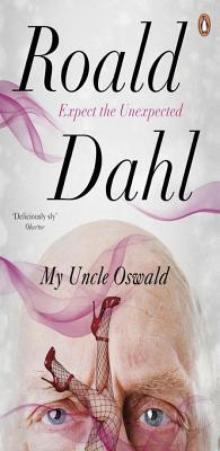 My Uncle Oswald
My Uncle Oswald The Best of Roald Dahl
The Best of Roald Dahl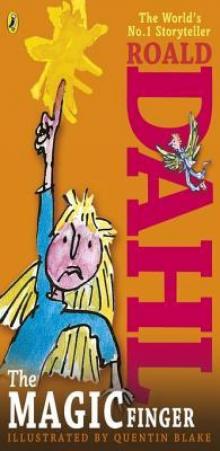 The Magic Finger
The Magic Finger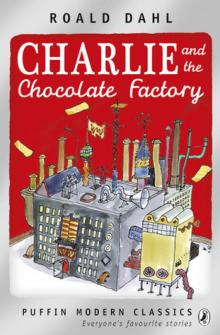 Charlie and the Chocolate Factory
Charlie and the Chocolate Factory Fantastic Mr Fox
Fantastic Mr Fox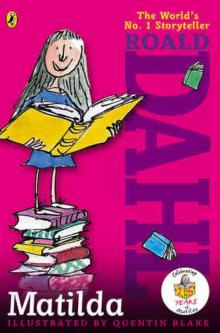 Matilda
Matilda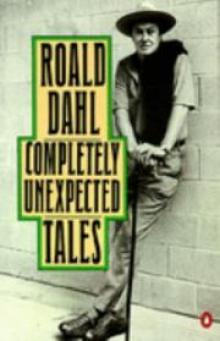 Completely Unexpected Tales: Tales of the Unexpected. More Tales of the Unexpected
Completely Unexpected Tales: Tales of the Unexpected. More Tales of the Unexpected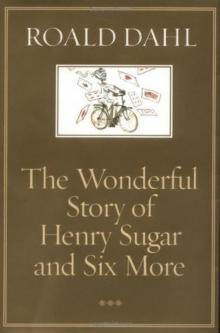 The Wonderful Story of Henry Sugar and Six More
The Wonderful Story of Henry Sugar and Six More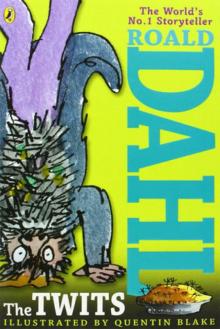 The Twits
The Twits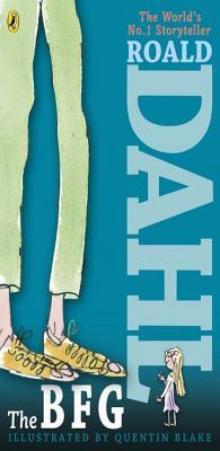 The BFG
The BFG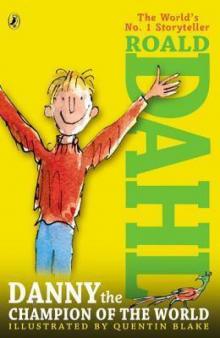 Danny the Champion of the World
Danny the Champion of the World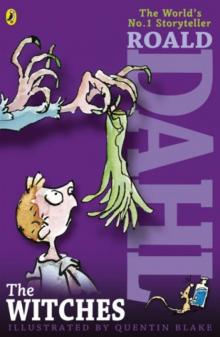 The Witches
The Witches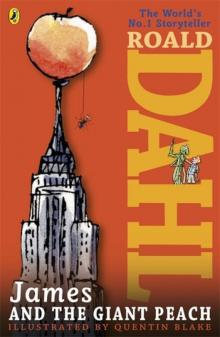 James and the Giant Peach
James and the Giant Peach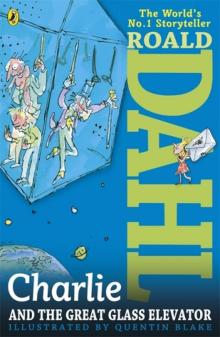 Charlie and the Great Glass Elevator
Charlie and the Great Glass Elevator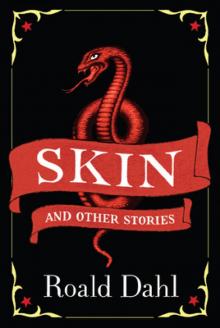 Skin and Other Stories
Skin and Other Stories Kiss Kiss
Kiss Kiss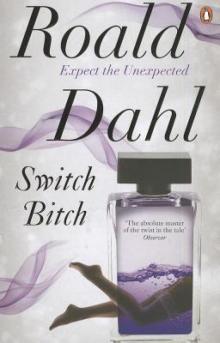 Switch Bitch
Switch Bitch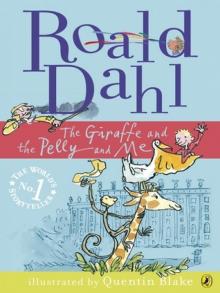 The Giraffe and the Pelly and Me
The Giraffe and the Pelly and Me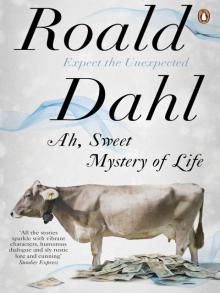 Ah, Sweet Mystery of Life
Ah, Sweet Mystery of Life Fear
Fear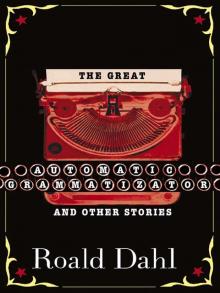 The Great Automatic Grammatizator and Other Stories
The Great Automatic Grammatizator and Other Stories Someone Like You
Someone Like You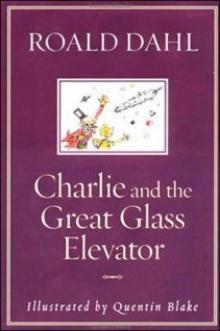 Charlie and the Great Glass Elevator c-2
Charlie and the Great Glass Elevator c-2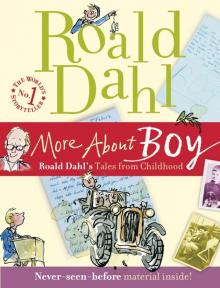 More About Boy
More About Boy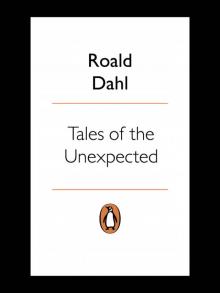 Tales of the Unexpected
Tales of the Unexpected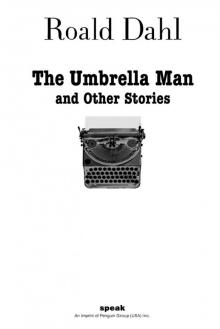 The Umbrella Man and Other Stories
The Umbrella Man and Other Stories Dirty Beasts
Dirty Beasts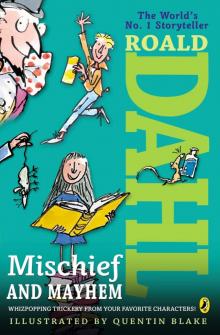 Roald Dahl's Mischief and Mayhem
Roald Dahl's Mischief and Mayhem The Collected Short Stories of Roald Dahl, Volume 1
The Collected Short Stories of Roald Dahl, Volume 1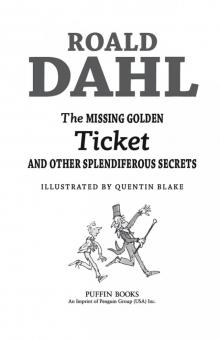 The Missing Golden Ticket and Other Splendiferous Secrets
The Missing Golden Ticket and Other Splendiferous Secrets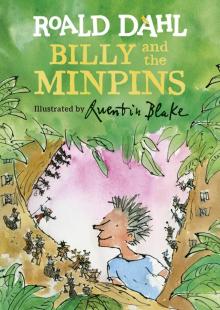 Billy and the Minpins
Billy and the Minpins Over to You
Over to You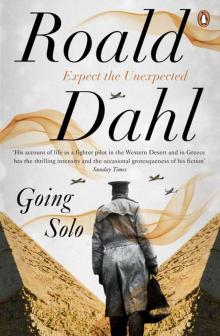 Going Solo
Going Solo Deception
Deception War
War Man from the South ee-3
Man from the South ee-3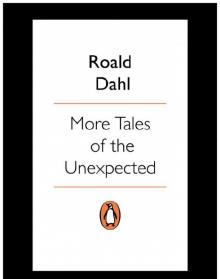 More Tales of the Unexpected
More Tales of the Unexpected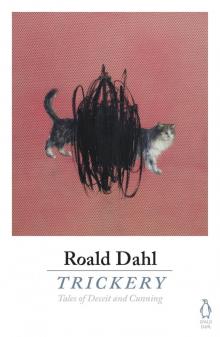 Trickery
Trickery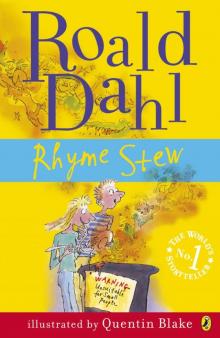 Rhyme Stew
Rhyme Stew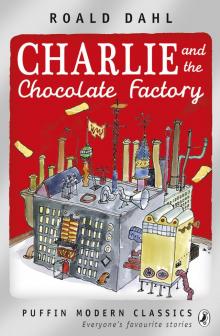 Charlie and the Chocolate Factory (Puffin Modern Classics relaunch)
Charlie and the Chocolate Factory (Puffin Modern Classics relaunch)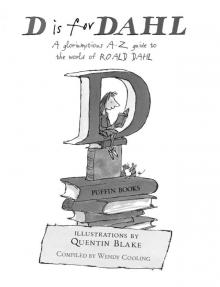 D is for Dahl
D is for Dahl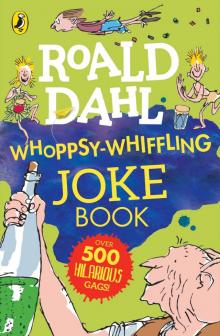 Roald Dahl Whoppsy-Whiffling Joke Book
Roald Dahl Whoppsy-Whiffling Joke Book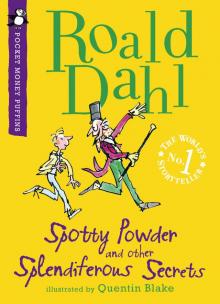 Spotty Powder and other Splendiferous Secrets
Spotty Powder and other Splendiferous Secrets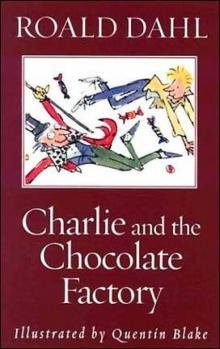 Charlie and the Chocolate Factory c-1
Charlie and the Chocolate Factory c-1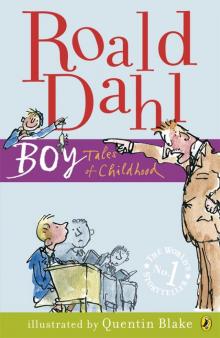 Boy
Boy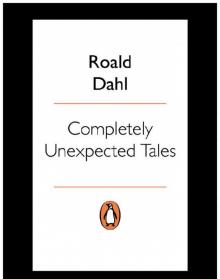 Completely Unexpected Tales
Completely Unexpected Tales Madness
Madness Innocence
Innocence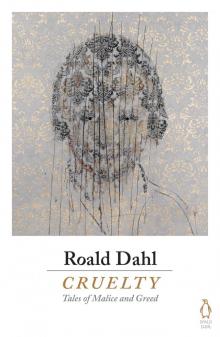 Cruelty
Cruelty George's Marvellous Medicine
George's Marvellous Medicine